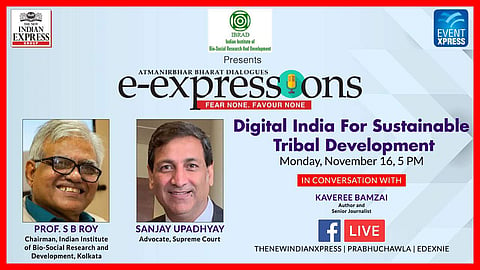

Digitally empowering India's tribal population will really happen when the right provisions of the laws governing them are taken to each one of them via smartphones and the internet, said Supreme Court Advocate Sanjay Upadhyay. "The real crux is not digital information but digital empowerment and how you use technology in this day and age to really empower these communities with the correct information, correct provisions in a simplified form. That's where we have lacked," he said while speaking at the New Indian Express' e-expressions, a series of virtual conversations on Monday.
Sanjay Upadhyay, who is an environmental specialist who practises in the SC, was in conversation with Professor SB Roy, Chairman, Indian Institute of Bio-Social Research and Development, Kolkata and senior journalist and author Kaveree Bamzai on Digital India for Sustainable Tribal Development.
Agreeing with him, Dr Roy added that more emphasis should be given on implementing the laws and integrating the framework that exists. "The tribals are located in remote areas, reaching them has been a problem. Digital technology is one of the devices through which we can reach them. Such technology can make a difference. Our own mental blocks have been an obstacle in the way of their development. We often design training programmes following the school syllabus or pedagogy but for tribals, the approach should be andragogy. We have the fast-growing approach, but a tribal's learning is at a slow pace, they move with the ecological system and nature. We need to think upside down, our approach has been treating them as beneficiaries, instead of learning from them. We have got mechanical thinking, which needs to shift to organic thinking. A 360-degree turnaround in the way we think is what we need for their sustainable development," he said.
Involving the tribal population in the way policies governing them are shaped is the only way to create a sustainable system, said Upadhyay. "There are certain social constructs around which decisions have to be made — what kind of developments should happen, who should be mining, who should be managing the forest there, what kind of social sector developments should come in etc. The government giving out doles or promoting tribal culture is only a very soft way of looking at it. Unfortunately, it is not the law which fails them. If you look at the text of the law it is absolutely fabulous, but the entire system on the ground, when it comes to implementation, faces the same old problem. Unless we tinker with it and move the structure around, it won't help. The communication of the spirit of the law is not met on the ground. Unless we are serious about including them in the decision-making process, we will not get there,"
Further emphasising this point, Sanjay Upadhyay added, "Constitutionally there are provisions to protect the tribal communities, but when we actually came down to legislating for their empowerment, there is an issue. Like what we did in 1996 with the Provisions of the Panchayats (Extension to the Scheduled Areas) Act. We made a very aspirational law. It does not become pragmatic, you may wish a lot of things of self-empowerment, make framework legislation but the bottom line is how do you take that idealistic sort of law on the ground? How do you take knowledge to the real empowerment of tribal communities, that's where we have missed the bus really. The rules were supposed to be framed so that everyone understood, but they were not easily accessible and simple."
Dr Roy goes on to add to this, explaining how our notions of tribal development are quite different from what they actually need. He said, "They value the tree not just as a tree. It is the same for their wildlife and nature — they have a spiritual connection with them, they have sacred groves, which they worship and value. The economic return is not calculated as we would do it. We have to think these resources as an integrated body, splitting them into parts has become very dangerous. For example, in terms of women empowerment, interestingly among the primitive tribes, women know much better about farming. We found that the women are more knowledgeable compared to their men, they hold the key, men also value them, they understand the family business. Thus, our notions of women empowerment have been found to be irrelevant for their sustainable development."
Slow living has suddenly become fashionable in the West, and there's a high probability that we will adapt their ways pretty soon. But the tribes have been doing this since inception. Responding to Kaveree's final question on how we can learn from them and make that the mainstream, Dr Roy said, "There should be some standard scientific method that can be applied universally like the human development index, which judges us based on the parameters of health, education and resources for a decent way of life. We can periodically evaluate and calculate within the state, and even nationally, and these parameters can be considered. That will lead to the consolidated development of the tribals. We should change our attitude to adapt to them. Sustainable tribal development with sustainable conservation will not only address the issue of the tribes but it will have an impact on us too."
